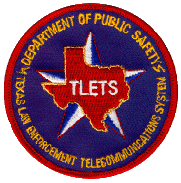 Wide area network services to local agencies have been provided by DPS since the early 1960’s. Arising from a 1937 ‘experiment’ with six (6) DPS offices exchanging information on a torn-tape relay teletype network, the DPS network has dramatically grown over the years and now interconnects over 1300 federal, state and local agency locations across the state. The driving force behind the continued application of technology has been an ever increasing need to organize and more rapidly access the data necessary for the performance of criminal justice activities within the state. Systems which today are complex databases were, in the not too distant past, index card trays and manila folders. Paper tape teletype has given way to networked personal computers, servers as well as mainframe computer system interconnections. Although the technology has changed substantially, the primary mission of the department’s systems and network remains the same; ‘To plan, implement, and manage a dedicated, secure, reliable, high speed data communications system to fully support the criminal justice communities in the performance of their charters: to protect and preserve the lives and property of the citizens of the state of Texas’.
Wide area network services to local agencies have been provided by DPS since the early 1960’s. Arising from a 1937 ‘experiment’ with six (6) DPS offices exchanging information on a torn-tape relay teletype network, the DPS network has dramatically grown over the years and now interconnects over 1300 federal, state and local agency locations across the state. The driving force behind the continued application of technology has been an ever increasing need to organize and more rapidly access the data necessary for the performance of criminal justice activities within the state. Systems which today are complex databases were, in the not too distant past, index card trays and manila folders. Paper tape teletype has given way to networked personal computers, servers as well as mainframe computer system interconnections. Although the technology has changed substantially, the primary mission of the department’s systems and network remains the same; ‘To plan, implement, and manage a dedicated, secure, reliable, high speed data communications system to fully support the criminal justice communities in the performance of their charters: to protect and preserve the lives and property of the citizens of the state of Texas’.
The Texas Law Enforcement Telecommunications System, TLETS, consists of a distributed software application and secure network services. TLETS is provided to over 100,000 Criminal Justice employees, through over 8,800 directly defined workstations and 40,000 devices defined to city and county systems that interface with TLETS. DPS strives to make TLETS available 24x7x365. The core component of TLETS is a store and forward message brokering system that ensures safe, secure delivery of content being transmitted throughout the system.
TLETS provides intrastate interconnectivity for criminal justice agencies to a variety of local, state, and federal data base systems. Additionally, TLETS’ link with Nlets, the International Justice and Public Safety Network, facilitates exchange between criminal justice agencies across the state of Texas to their counterparts in other states. The link with Nlets allows DPS to provide critical information to the national criminal justice community and allows TLETS operators to obtain information from a variety of data base services from other states, Canada, Interpol, and private companies.
TLETS also provides the DPS and local criminal justice agencies with access to the Texas Crime Information Center (TCIC); DPS’ Computerized Criminal History System (CCH); DPS’ Driver License System (DLS); The Department of Motor Vehicles’ Registration Title System (RTS), TexasSure – the Financial Responsibility Verification Program (FRVP) and Texas Parks and Wildlife (TPWD).
As the Control System Agency (CSA) for the Federal Bureau of Investigation's National Crime Information Center (NCIC), DPS serves as the connection point for all data between Texas agencies and NCIC. Through the services of the NCIC system, the FBI maintains stolen and recovered property files, person files, computerized criminal history (CCH) data and the Interstate Identification Index (III) which is used as a pointer to criminal history files resident on state systems. Federal and state law regulates access to and dissemination of CCH, and prescribes security and privacy rules for systems which access CCH. DPS is responsible to insure that FBI CJIS Policy is applied to Texas agencies accessing FBI data.
DPS, in concert with other agencies, is actively involved in the evaluation of network services, supporting application systems, and adopting new information sharing partners in an effort to provide the Texas criminal justice community with efficient, effective and cost sensitive strategies. Information about the various initiatives will be made available to member agencies on the TLETS secured webpage, through the TLETS Newsletters, through administrative messages and by email on the TCIC2000 Listserv.
Comments or questions should be directed to tlets@dps.texas.gov.
